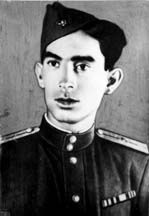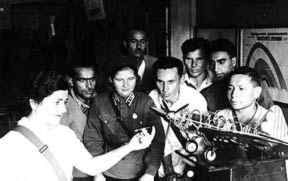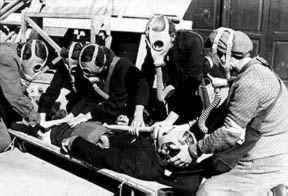|
Autumn
1999 (7.3) War and its
Legacy
Photo: Husein Abbaszade, 1945. On June 14,
1941, I was drafted by the Soviet Military Committee, given a
medical examination and told to report for duty the next day. When I did,
they immediately shipped me off to Tetroskariyo (Aghbulag) village
in Georgia where the Communications Battalion No. 442 was stationed.
Many Azerbaijani soldiers were located there.
At the beginning of the war, soldiers from Turkic-speaking regions such as Azerbaijan and Central Asia had immense problems because most of them couldn't speak Russian. The commanders, all being Russians, of course, spoke only Russian and had little tolerance for those who didn't. When the soldiers couldn't understand what was going on, the Russian commanders insulted, abused them and even punished them. I was one of the lucky few who knew Russian. Eventually, we went to Berlin. I was fighting in the Army's 59th Division. For my service as a commander of the anti-aircraft gun platoon, I was awarded the "Order of the Red Star". The highest rank I achieved during the war was Senior Lieutenant with the responsibility as Deputy Battery Commander. Memories of War  If someone says
he's not afraid of war, it's a lie. If someone says
he's not afraid of war, it's a lie. He's for the first time, it's so horrible-you're scared of everything. You see soldiers dying all over the place, tanks exploding, cannons shooting, bombs dropping. As time passes, you get used to it all. Your feelings, your nerves, your emotions-all become numb. After a while, it all seems so commonplace. During the war, if anyone tried to flee during battle, the commanders had orders to kill him. The military leaders demanded absolute obedience as any defections would completely undermine their authority and jeopardize the entire unit. They shot any runaway soldier just to set an example for the rest of the men. Photo: Marines from Baku headed for the war front in 1942. National Archives. Sometimes the conditions we fought under were grueling; other times, less so. We were often short of guns. Often two soldiers shared the same weapon. Food was a severe problem most of the time. I've seen soldiers so hungry they stole food from each other. Once when I was in the hospital, there was another wounded soldier lying in the bed next to mine. He asked me to scratch his foot so I raised the blanket only to discover that his leg had been amputated. I was shocked, but I didn't want him to notice, so I began scratching the mattress. He started shouting at me, "Why don't you scratch it? I can't feel it." Obviously, the nerves were still sensitive even though the limb itself had been amputated. The wounded soldier had forgotten that he no longer had a leg. Sometimes I'm asked if I had a girlfriend during the war. I'll tell you-we were in Germany at the time. It was late March 1945. During the war, it was a big deal to receive a letter from home. In my case, it had been such a long time since I had received any word from my family. A beautiful Russian girl named Antonina used to bring letters to us soldiers. I would always ask her if there were any letters for me, and she would reply that if ever there were, she would bring them with great pleasure, but it never happened. Soon afterward, the Germans bombed us; Antonina was killed during the attack. I was so broken when we buried her. Another girl in our regiment told me that Antonina had fallen in love with me, and that she had arranged to bring letters to our regiment just to have the chance to see me. I'll never forget her. The war taught me a lot. Some say that war makes people savage and barbaric. But I think the exact opposite happens. War makes people more sensitive. War teaches you what hunger, pain, poverty and death are all about. It teaches you what it means to be separated from your homeland, your family, your friends. Azerbaijan's Contribution Even when Russians write about the war, they admit that Baku's oil greatly contributed to the outcome of the war. In 1942, for example, about 70 percent of all Soviet tanks, airplanes and armored vehicles were operating with Baku oil. A munitions factory in Baku also played an important role in supplying the Soviet Army with various kinds of guns. It was named after Lieutenant Pyotr Petrovich Schmidt, a German who helped to organize the October Revolution (1917). When the men left for war, the women took their places in the factories. Azerbaijan also provided various foodstuffs, not to mention soldiers themselves. Approx-imately 700,000 Azeris fought in the war; nearly 400,000 of them died. This was an enormous sacrifice when you consider that the total population in Azerbaijan at that time was only about 3.27 million. My older brother was among the victims. Azerbaijan made an incredible contribution to the war despite the fact that not a single battle was fought on its land and not a single bomb was dropped on its cities. During the war, few in the international community knew that Azerbaijanis were fighting in the war. They only heard about the Russians. True, Russia played a leading role, but there were 14 other republics within the Soviet Union that supplied soldiers and guns, too. Hitler had his eye on Azerbaijan's oil, convinced that if he could capture Baku, the Germans would win the war. He had battle plans already drawn up to attack Baku on September 25, 1942. Then his defeat in Stalingrad brought the German advance to an abrupt halt. Who knows if Hitler had captured Baku's oil, whether the war might have had an entirely different outcome? War's End In 1945, when the German officers realized that they were losing the war, they started fighting in civilian clothes, hiding themselves and shooting at us from attics-just like the Serbs are doing today. I lost one of my friends during one such episode. His death affected me deeply. How tragic it is to die when you're so close to victory and after you've gone through so much. I myself was wounded on April 21; victory was declared on May 9. At first, I was taken to a hospital in Hindenburg. Then Stalin gave the order that all officers were to be transferred to Soviet hospitals. When we were heading back to the Soviet Union, we were told that we would go through Baku, so I asked the commander if I could leave the train for just a few moments to see my family when we arrived. My mother was very ill at the time and I wanted so much to see her. But the commander wouldn't allow it. When we arrived in Baku, I could do nothing but lie down in the train, crying and cursing my commander. The train used to stop at night so that the wounded could rest. When we were in Krapotkina, we heard shooting. The soldiers began to shout that it must be the German Fascists. But after paying closer attention, we realized that the voices were coming from crowds of people who had gathered. "Victory! Victory! We won!" they were yelling. Russian women brought food onto the train for us. One of them stroked my hair and started to cry, saying that she had lost her son in the war. I saw another old woman with a small boy beside her. They came up to me and the boy asked her: "My dad is fighting, too, isn't he?" The woman just stroked his hair. After the boy went over to talk to other soldiers, the woman told me that the child had lost both of his parents in the war and still thought that his father was off fighting. Home At Last I didn't make it back in Baku until the end of August 1945. I had sent my family a telegram from Tbilisi, Georgia, so they could plan to meet me at the station. I had even told them in which train car I would be riding. But no one came. When I got off the train in Baku, I was walking with a cane, with great difficulty. Everyone was crying, as families embraced the soldiers. I bent down, scooped up a handful of Baku's soil and kissed it. I kept looking for someone from my family, but no one was there. I was afraid that something had gone wrong-perhaps my mother had died. An army buddy handed me a bunch of flowers that his relatives had brought him and said, "Let's go to my house." But I told him "no" and began walking slowly toward the tram stop towards my own place. My heart was so heavy. Why hadn't anyone come to meet me? When I entered our narrow alley, a few children were playing in the yard. I saw the place where we lived and realized that one of the two rooms had collapsed. My mother was lying safely in the other room but she was so weak and listless. As soon as my sister saw me, she started sobbing. Mother crawled out of bed, came over and hugged me and began crying, too. That's when I burst into tears myself. They told me that they hadn't received my telegram; that's why they hadn't come. Three days later the postman brought the telegram. I myself signed for it. Lost and Found My family sent three sons into the Soviet Army. My oldest brother, Aliagha, born in 1916, died in the war. My brother Karim, three years older than me, went missing in action. Fifty years later we discovered that he was still alive and living in France. It's amazing that we found each other again after all that time. I had been writing a lot of military novels and short stories that were made available in a number of countries. Somehow my brother stumbled upon one of them. In 1993, two years after Azerbaijan had gained its independence from the Soviet Union, we received a letter from him saying that he was still alive but that he was afraid to return to Azerbaijan. It didn't matter that the Soviet Union had already collapsed; he was still afraid. Keep in mind that Stalin had declared that death was more honorable than captivity. He made no exceptions even when his own son Yakov was captured. The story is told how even when the Germans tried to use his son as a bargaining chip, Stalin had not budged. "Give us Paulus (one of the German generals), and we'll give you back your son," they had said. But Stalin allegedly replied: "I don't normally exchange a regular soldier for a general." Azerbaijani soldiers who had been captured by the Germans and then released in a prisoner exchange back to the USSR ended up being executed or exiled to Siberia. My brother was still afraid that that would happen to him, even though Stalin had already been dead for 40 years. Half a century later, he still feared that he would be arrested and executed as a traitor. During the war, he had been fighting on the right bank of Dnepr River1 when he had been injured and transferred to a hospital there. When the Germans attacked, the wounded were left behind in the hospital. Those who could flee, did so. The remainder were captured by the Germans and transferred to Berlin where they were held in a concentration camp. After the war, my brother went to France, where he graduated from Lyons University and became a translator between the Russian and Turkish languages. You can imagine how shocked and overwhelmed we were to receive his letter after such a long time. When we finally had the chance to talk to each other on the phone, we "kind of" had a conversation. I say "kind of" because we were so overcome with emotion and tears. I would say: "Karim, is that you? Where are you?" and then I would start sobbing. And he would say, "Husein, is that really you?" and the same thing would happen to him. Since 1993, my brother has visited us in Baku three times. When we first saw each other again, he told me that he had even been afraid to write. He feared the authorities would retaliate against family members. He was right-during the Soviet times if they ever suspected that you had a relative living abroad, they created a lot of trouble for you. General Aslanov During the war, it didn't occur to me to ever become a writer, but I eventually wrote four novels and nearly 100 short stories, many of them about my experiences during the war. Today I hold the title, "People's Writer of Azerbaijan". I've made a collection of my short stories under the title "From Lieutenant Giyaszade's Diary." Giyaszade was my nickname. I also wrote a book called "General," which is about the World War II Azerbaijani General Hazi Aslanov. The first section of the book was published in 1957. The second part followed in 1962. I interviewed some of the soldiers who had fought with Aslanov and also talked to his mother and wife, who were still living at the time, as were his children. Then I was given permission to do further research in Stalingrad, where the Soviets had their first significant victory. After that battle, the Soviets began pushing the Germans back. Hazi Aslanov's brigade was one of those that surrounded the German Army. He became a colonel after Stalingrad and eventually was recognized as "Hero of the Soviet Union," the highest national medal of heroism given during the war. An article in Pravda2 at the time insisted that the enemy "must be hunted down the way Aslanov does it." Aslanov was famous for his "flank blow" technique ("jinah zarbasi" in Azeri or "flangoviy udar" in Russian). The literal translation is "thrust from flank." During World War II, tanks were considered the most effective forces for launching an attack. Aslanov had devised a technique of launching an attack by heading straight toward the enemy. Meanwhile, other Soviet troops were sent to attack from the sides. Hazi Aslanov was awarded the title of Hero of the Soviet Union only once, but actually if he had been treated like Russian heroes, he should have received it twice. The Soviet government was always hesitant about acknowledging the contributions of non-Russians in all fields, whether it be art, music, literature, sports or science. The same was true in military science. A number of us Azerbaijani writers including Anar (Head of the Writers' Union), Yusif Samadoglu, Suleyman Rustam (secretary of the Supreme Soviet of Azerbaijan at the time) and I prepared an official letter appealing to the Soviet government regarding this matter. They ignored us. Only after the Black January events in 1990 did they acknowledge the problem. Situation with Armenia As a veteran of World War II, I would never have dreamed a day would come when Azerbaijan would be at war and that it would be the Russians who instigated it. I would never have believed that two neighbors-Azerbaijan and Armenia-would be enemies, and that the soldiers of the army in which I once served would be aiming their guns at my country. I can't understand why Russia is doing this after we supported them so solidly during World War II. During the Karabakh War, our soldiers captured Russian officers who were fighting on the Armenian side. So, no matter how much the Armenians try to deny or cover it up, Russians and mercenaries were fighting with them. Of the total population of Nagorno-Karabakh, about one-third were Azerbaijanis. The rest were Armenians who, admittedly, made up the majority. Nevertheless this was no excuse for our people, who had lived on those lands for centuries, to be driven out. The Soviets even took away our shotguns when the Karabakh War started, but supplied Armenians with everything, including missiles. They even trained Armenian soldiers in Russia. So, the 200-year-old lie of the Russian Empire continues. It was Russia who invaded our cities, towns and villages but insisted that Armenia was acting alone. But Armenia could never have carried out such devastation without their help. Consider also the fact that all the while that Armenia was invading our lands and killing our people, they were telling the world that it was Azerbaijan that was the aggressor. Russia supported Armenia's invasion of our country at the same time that Armenians were blaming Azerbaijan for the war. But we are the ones who are the victims of their aggression. Another thing that I will never be able to comprehend is why a country like the United States, which is considered to be the stronghold of peace, justice and democracy, has supported and still continues to support these liars. The U.S. funnels enormous amounts of aid to their government, while denying all aid to ours. I can explain it in no other way than by saying it's just a continuation of the lies that surround politics, nationalities and war. It's just like what I first began to realize was happening when I was recruited into the army nearly 60 years ago.
|





